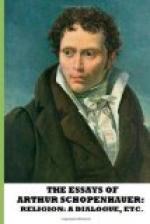Demopheles. If the results haven’t everywhere been in keeping with the purity and truth of the doctrine, it may be because the doctrine has been too noble, too elevated for mankind, that its aim has been placed too high. It was so much easier to come up to the heathen system, or to the Mohammedan. It is precisely what is noble and dignified that is most liable everywhere to misuse and fraud: abusus optimi pessimus. Those high doctrines have accordingly now and then served as a pretext for the most abominable proceedings, and for acts of unmitigated wickedness. The downfall of the institutions of the old world, as well as of its arts and sciences, is, as I have said, to be attributed to the inroad of foreign barbarians. The inevitable result of this inroad was that ignorance and savagery got the upper hand; consequently violence and knavery established their dominion, and knights and priests became a burden to mankind. It is partly, however, to be explained by the fact that the new religion made eternal and not temporal welfare the object of desire, taught that simplicity of heart was to be preferred to knowledge, and looked askance at all worldly pleasure. Now the arts and sciences subserve worldly pleasure; but in so far as they could be made serviceable to religion they were promoted, and attained a certain degree of perfection.
Philalethes. In a very narrow sphere. The sciences were suspicious companions, and as such, were placed under restrictions: on the other hand, darling ignorance, that element so necessary to a system of faith, was carefully nourished.
Demopheles. And yet mankind’s possessions in the way of knowledge up to that period, which were preserved in the writings of the ancients, were saved from destruction by the clergy, especially by those in the monasteries. How would it have fared if Christianity hadn’t come in just before the migration of peoples.
Philalethes. It would really be a most useful inquiry to try and make, with the coldest impartiality, an unprejudiced, careful and accurate comparison of the advantages and disadvantages which may be put down to religion. For that, of course, a much larger knowledge of historical and psychological data than either of us command would be necessary. Academies might make it a subject for a prize essay.
Demopheles. They’ll take good care not to do so.
Philalethes. I’m surprised to hear you say that: it’s a bad look out for religion. However, there are academies which, in proposing a subject for competition, make it a secret condition that the prize is to go to the man who best interprets their own view. If we could only begin by getting a statistician to tell us how many crimes are prevented every year by religious, and how many by other motives, there would be very few of the former. If a man feels tempted to commit a crime, you may rely upon it that the first consideration which enters his head




